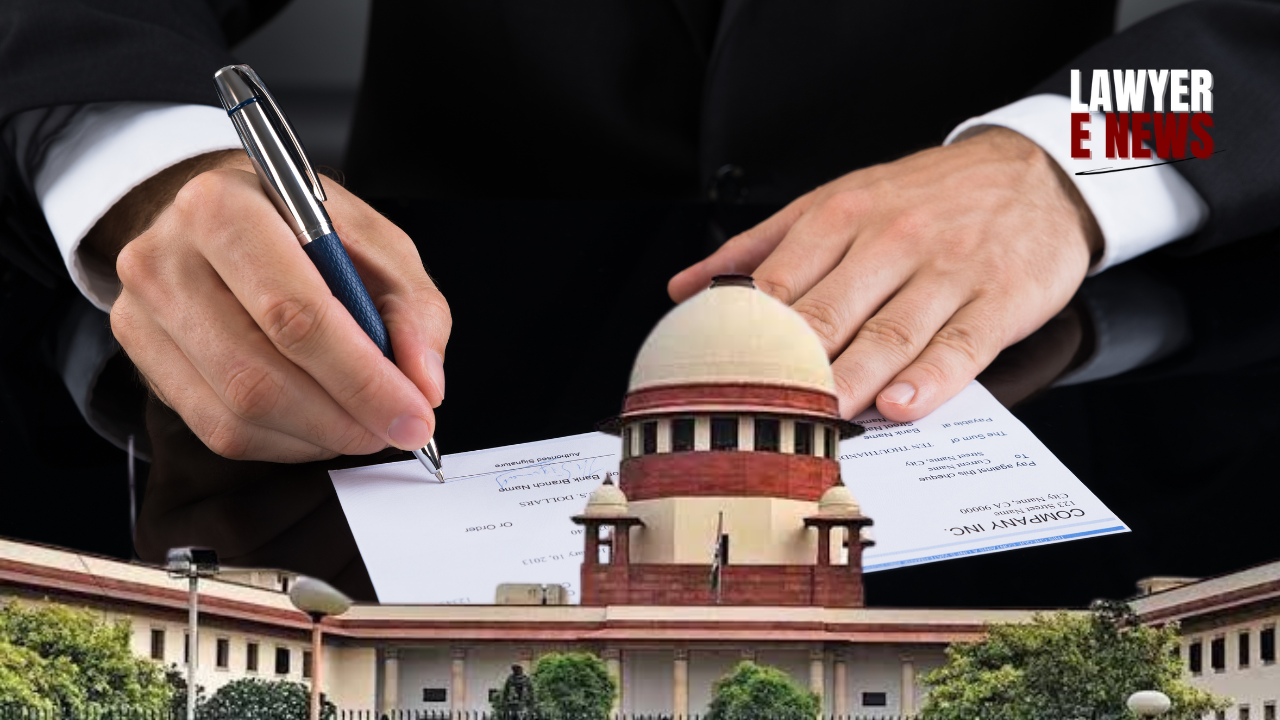-
by Admin
16 February 2026 1:47 PM



“Simply drafting a retirement deed is not enough — statutory mandates of the Partnership Act must be fulfilled to absolve liability under the NI Act” — In a significant ruling clarifying the liability of retired partners in cheque dishonour cases, the Supreme Court of India held that mere internal retirement without public notice is insufficient to absolve a partner of vicarious liability under Section 138 read with Section 141 of the Negotiable Instruments Act, 1881. The Court set aside the High Court's order that had quashed criminal proceedings against the respondent partner under Section 482 CrPC, restoring the complaint for trial.
The bench comprising Justice Abhay S. Oka and Justice Augustine George Masih ruled that statutory compliance under Sections 32, 62, 63, and 72 of the Indian Partnership Act, 1932 is mandatory for a retiring partner to escape liability, and disputed factual claims cannot be adjudicated summarily under Section 482 CrPC.
The case arose from a complaint filed by Shivappa Reddy under Section 138 of the NI Act against M/s AVS Constructions, a registered partnership firm, and its partners, including S. Srinivasan (Respondent/Accused No.4), for dishonour of twelve cheques of ₹50 lakhs each, totalling ₹6 crore, issued towards the refund of a sale consideration.
The cheques were dishonoured due to ‘stop payment’ instructions, and despite issuance of statutory notices, no repayment was made. The complaint was filed under Section 200 CrPC, and the Magistrate took cognizance and issued summons to the accused.
However, S. Srinivasan moved the High Court under Section 482 CrPC, seeking quashing of proceedings on the ground that he had retired from the partnership firm on 01.04.2015, prior to the issuance of the cheques.
The High Court of Karnataka, by order dated 23.09.2023, allowed the petition, holding that:
“The respondent had retired from the partnership firm before the issuance of the cheques, and since the cheques were not signed by him, he cannot be held vicariously liable under Section 138.”
Challenging this, the complainant approached the Supreme Court, asserting that no statutory compliance was made regarding the respondent's retirement, and therefore he remained liable as a partner.
The Supreme Court found the High Court’s decision legally unsustainable, holding that:
“None of the requirements as provided and mandated under the Partnership Act have been adhered to by the Respondent.”
“Retirement Must Be Publicly Notified” – Non-Compliance with Sections 32, 62, 63, and 72 of the Partnership Act
The Court observed that the Indian Partnership Act requires the retirement of a partner to be notified to the Registrar of Firms, and a public notice must be issued in a vernacular newspaper.
“Merely putting forth a resignation or accepting it through a retirement deed is insufficient... Unless proper public notice is issued and recorded in the Register of Firms, the partner remains liable.”
The Court emphasized the significance of Section 72, stating:
“A retired partner must publish a public notice in one vernacular newspaper where the firm is situated. No such notice was produced or mentioned by the Respondent.”
Signing of Cheques Not Essential for Liability Under Section 141 NI Act
Addressing the High Court’s finding that the respondent didn’t sign the cheques, the Supreme Court clarified:
“Signing of the cheques by one partner does not absolve other partners, especially when specific averments exist about the involvement of all partners in the firm’s day-to-day affairs.”
The Court referred to allegations in the complaint that the respondent was present when the cheques were signed, and had assured repayment, thereby establishing a prima facie case under Section 141 NI Act.
High Court Exceeded Jurisdiction Under Section 482 CrPC
Criticizing the High Court’s summary quashing, the Supreme Court observed:
“The plea of retirement is a disputed question of fact and law. These cannot be adjudicated in a petition under Section 482 CrPC.”
The Court held that the High Court had exceeded its jurisdiction by entertaining and accepting factual claims without trial, and reiterated that such matters require evidence and must be decided during trial proceedings.
The Supreme Court allowed the appeal, setting aside the High Court’s order and restoring the criminal complaint for trial:
“The order dated 23.09.2023 passed by the High Court is hereby set aside. Proceedings before the ACMM, Bengaluru in CC No.17788/2020 are restored. The Trial Court is directed to proceed in accordance with law.”
The Court also clarified that: “Any observations made in this order shall have no bearing on the merits of the case in the trial... restricted to the decision in the limited compass of the jurisdictional sphere.”
This judgment reaffirms the strict procedural requirements under the Partnership Act for valid retirement of partners, and cautions against using Section 482 CrPC to escape trial on factual disputes. It also underscores that in cheque dishonour cases involving partnership firms, all partners may be vicariously liable, irrespective of who signed the cheques, if there are specific allegations of participation in the firm's operations.
Date of Decision: May 19, 2025
